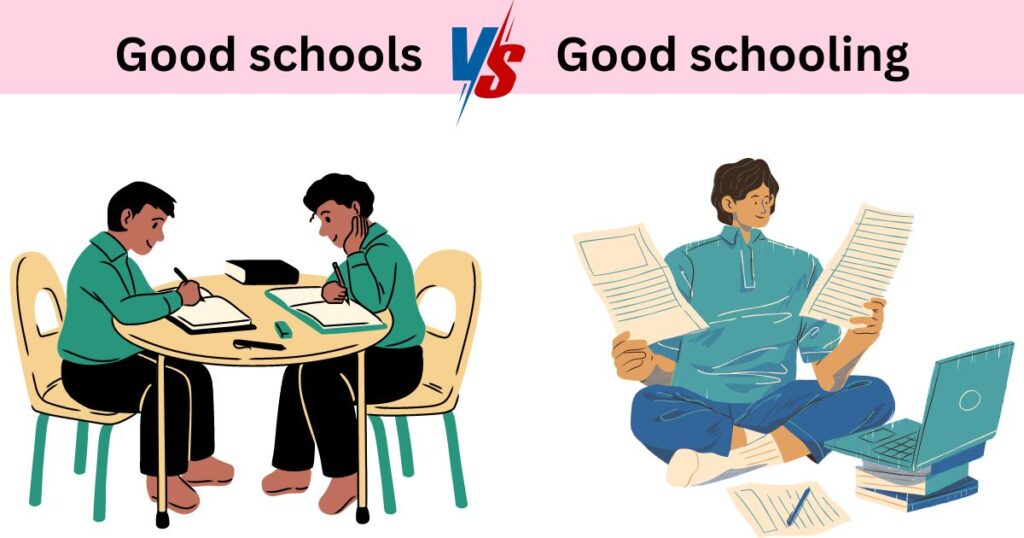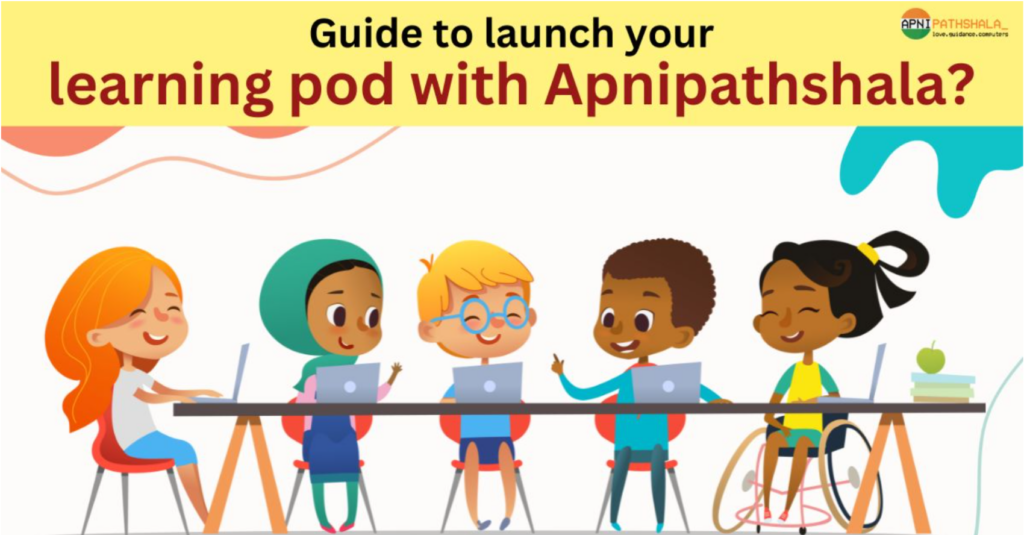Good Schooling vs Good Schools

Ever wonder what really makes a school great? Is it the teachers, the buildings, or something deeper? What if it’s the values and life skills taught there? When choosing for your child, should you focus on good schooling or good schools? Let’s break down why both matter and how they play different but essential roles in a child’s education. What role does Good Schooling play? Think about the difference between just knowing facts and actually understanding the world around you. Good schooling isn’t just about memorizing dates and formulas; it’s about teaching students how to think critically. Imagine a classroom where kids are encouraged to ask “why” and “how” instead of just accepting information as it is. When students learn to think this way, they don’t just learn—they start to love learning. This kind of curiosity and problem-solving mindset sticks with them for life, helping them navigate all sorts of challenges, both in and out of the classroom. Good schooling is like a garden where every student can grow in their own way. It’s not just about grades and test scores; it’s about helping each child discover who they are. Schools that focus on the whole child provide a variety of activities—like sports, arts, clubs, and more—so that students can explore different interests and find what they’re passionate about. This personal growth isn’t just a nice-to-have; it’s crucial. When kids find what they’re good at and what they love, they build self-esteem and a strong sense of identity. And that’s what helps them confidently take on life’s challenges. Think about the difference between just knowing facts and actually understanding the world around you. Good schooling isn’t just about memorizing dates and formulas; it’s about teaching students how to think critically. Imagine a classroom where kids are encouraged to ask “why” and “how” instead of just accepting information as it is. When students learn to think this way, they don’t just learn—they start to love learning. This kind of curiosity and problem-solving mindset sticks with them for life, helping them navigate all sorts of challenges, both in and out of the classroom. Teachers are the heart of any school, and good schooling recognizes just how important they are. Imagine a school where teachers aren’t just doing the same thing year after year but are constantly learning and improving. Good schooling invests in professional development for teachers, giving them the latest tools, techniques, and knowledge to bring into the classroom. When teachers grow, so do their students. This ongoing training means that students receive top-notch instruction that’s always evolving with the times, making sure they’re getting the best education possible. No two communities are the same, and good schooling understands that. Imagine a school that doesn’t just follow a one-size-fits-all approach but instead tailors its programs to fit the unique needs of its students. Whether it’s adjusting the curriculum to better reflect students’ cultures or introducing new subjects that match the interests of the community, good schooling is flexible and responsive. This adaptability makes learning more relevant and engaging for students because they see themselves and their world reflected in what they’re studying. It’s not just about teaching them facts; it’s about making sure those facts matter to them. What role does Good School play? Good Schools understand that the concept of education is about more than just academics and emphasises on holistic development of students. They offer programs on life skills, social-emotional learning and character development. which encourage students to develop into individuals who are prepared for the challenges of life. By treating students respectfully and teaching the value of self-esteem and self-worth, a good school provides a supportive environment where students feel safe and valued.This includes treating students with kindness, understanding their needs and providing a safe space for learning Good Schools are committed to the well-being and health of their students. This means providing a safe environment and addressing the physical and mental health needs of students. This includes providing nutritious meals, ensuring a safe environment, and addressing the physical and mental health needs of students. When students are in perfect health, they are better able to focus on their studies and thrive in school Why do Good Schooling and Good Schools Matter for Children? Combining good schooling with good schools creates a balanced approach to education that provides the educational practices and philosophy that promote student growth and adaptability. Good schools offer a supportive environment that helps students succeed which makes sure that students receive a high-quality education that prepares them for the future. We, at Apni Pathshala, believe in the importance of both good schools and good schooling. By encouraging responsible individuals to step up as educators of tomorrow, we encourage the establishment of micro-schools, homeschools, and alternative learning classrooms. Our goal is to establish self-sustainable educational programs that equip students with essential technical and digital skills and enhance academic performance by providing resources Why Apnipathshala Stands Out? Apni Pathshala encourages community leaders, teachers, and passionate individuals to create educational programs that reflect the needs of their communities. Apni Pathshala’s decentralized model allows for flexibility and adaptability, ensuring that education is tailored to the students it serves with the establishment of PODs,micro-schools, homeschools and alternative learning environments By providing students with access to computers and digital resources, Apni Pathshala places a strong emphasis on learning digital literacy and technical skills. This focus on technology makes sure that students are prepared for the digital world and have the skills they need to succeed. Apni Pathshala provides ongoing support and monitoring to ensure the success of its programs. By collecting weekly updates and video feedback from students, Apni Pathshala can provide tailored support and guidance to address specific needs and challenges. This approach ensures that educational programs are continuously improving and effective Conclusion: The Importance of Good Schooling and Good Schools Addressing the whole child and providing a supportive environment in the form of good schooling and good school helps students thrive as individuals. Combining the principles of
A Guide to Launch Your Learning Pod with Apnipathshala

Welcome to the journey of launching your very own Learning Pod with ApniPathshala! With over 50 pods launched and running throughout India, we are here to support and encourage you to start your own pod. So that you can make a change in your community and create an impactful educational environment. Even if you are a passionate educator or an individual who wants to make a difference in their community, we will help you launch your very own POD. Who Should Launch an Apni Pathshala Pod? So, who’s the right person to start one of these pods? Honestly, if you care about education and want to make a real difference in your community, this could be a great fit for you. You don’t have to be a tech whiz or an education expert. What you really need is the passion to help kids in your area get a better education Maybe you’re a community leader, a teacher, or just someone who’s got a bit of extra space and a big heart. If you’ve got a room in your house, a community centre, or even a classroom that’s not being used, you’ve already got a good start. Apni Pathshala provides everything else—the computers, the learning plans, and the support. All you need to bring is the desire to make a difference. What are the requirements to open the pod? First things first—let’s talk about the space you’ll need. To launch a successful Apni Pathshala pod, you’ll need a room that’s at least 20 feet by 10 feet. This isn’t just about fitting in the equipment; it’s also about creating an environment where students can learn comfortably. Think of this space as the heart of your pod—a dedicated area where computers, learning, and inspiration all come together. Next up is the infrastructure—basically, everything you need to keep the pod running smoothly. Finally, let’s talk about the people who will make this pod come to life. By meeting these requirements, you’ll be setting the stage for a successful and impactful learning pod. Application Process for Launching an Apni Pathshala Pod Steps to Apply for Launching a Pod 3.Wait for a Response: After you share the email, the team will take some time to review it. They receive a lot of applications, so be patient. Documents and Information Required for Application Before you start filling the application, it’s a good idea to gather some important documents and details. Here’s what you’ll likely need: – Proof of Ownership or Lease: You’ll need to show that you have a dedicated space available for the pod. This could be a room in your house, a rented space, or a community center. – Basic Infrastructure Details: Be ready to provide information about the room’s size, the number of electrical sockets available, and your internet connection speed. Remember, they require a minimum of 10 MBPS. Expected Timelines and Approval Rates Now, here’s the part where patience comes in. Apni Pathshala gets tons of applications each month, so it can take some time to hear back. Typically, they approve about 1 out of every 5 applications, so while there’s a bit of competition, don’t get discouraged! Once you submit your application, expect to wait a few weeks for a response. If your application is approved, you’ll move on to the next steps, like setting up your pod with the equipment they provide. Contact Details and Support for Application Queries Got questions along the way? No problem! Apni Pathshala is there to help. You can reach out to them through their official website’s contact page or email them directly. If you’re stuck on a particular part of the application or just want to make sure you’re on the right track, don’t hesitate to ask for help. They’re just as invested in your success as you are. Setting Up Your Pod Receiving Equipment Once your application is approved and you’re ready to launch your Apni Pathshala pod, the first step is receiving all the necessary equipment. This is an exciting moment because it’s when everything starts to feel real. Here’s what you can expect to receive: – 10 Selligion Praho 2 Computers – 10 Monitors – 10 USB Webcams – 10 Wired Keyboards and Mic: – 10 Wired Headphones This equipment is designed to create a complete, functional learning environment where students can access the best educational resources available. – 12-Month Usage: The equipment provided by Apni Pathshala is on loan for a 12-month period. During this time, it’s your responsibility to keep everything in good working order. This means regular maintenance, careful handling, and ensuring that the equipment is used solely for educational purposes. – Equipment Care: Apni Pathshala expects you to take good care of the equipment so that it can be used by other pods after your 12-month period. Any misuse, such as overclocking or using the computers for non-educational activities, could result in penalties or the early removal of the equipment. By following these guidelines, you help ensure that the equipment can continue to benefit students long after your pod’s initial year of operation. Conclusion As we wrap up, let’s take a moment to reflect on the incredible benefits and impact of launching an Apni Pathshala pod. By creating a space dedicated to learning, you’re not just providing students with access to computers and the internet—you’re opening doors to a brighter future. These pods are more than just rooms filled with equipment; they are hubs of opportunity where children from underserved communities can explore, discover, and grow. Don’t hesitate—take that step today. Your community is ready for this, and with your help, we can build a future where every child has access to the education they deserve. Let’s make it happen, together.
